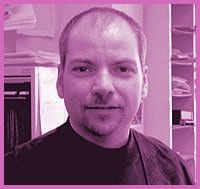Egale Canada is experiencing growing pains, and it’s costing the organization money.
The gay and lesbian advocacy group, which capped a busy 2003 with its annual general meeting in Vancouver Mar 20, finished with a $30,000 deficit for the year.
But executive director Gilles Marchildon says the deficit is an unavoidable result of the organization’s expansion and increasing influence.
Marchildon says the biggest change for Egale in the past year has been growth.
“We’ve grown – that’s undeniable. You’ll see from our report that our staff and our budget have pretty much doubled,” says Marchildon, noting that growth can be a challenge.
“There has been a significant amount of growth and that’s a very good thing but it’s a challenge. Just as a teenager growing up – it’s a good thing – but it can be quite challenging, you know, we’ve got growing pains.”
Some of that pain is evident in the organization’s financial statements. In 2002, Egale had revenue of $260,859 and expenses of $233,595. In 2003, revenue was $398,044 with expenses of $428,312.
The organization has also seen a growth in its membership. Egale reports its total 2003 membership at 3,763 – a 17.7 percent increase from the previous year. The majority of those members (55.4 percent) are in Ontario, while representation in Quebec (10.2 percent) remains low, relative to population.
But while the past year was a crucial one for Egale, Marchildon is looking ahead. Ask him what the coming year holds for the organization and he will ask you where he should start.
While same-sex marriage, the Kimberley Nixon case and Terry Haldane’s constitutional challenge remain issues, Marchildon says Egale’s immediate focus is the federal election. An election will likely be called in the spring (See sidebar story for more information on ongoing Egale initiatives.).
“If candidates don’t hear about LGBT issues during their campaign then it is quite possible that they will pay less attention to those issues, once they are elected,” he warns.
Marchildon sees complacency as the biggest issue facing the LGBT community.
“Federal elections are a key time,” says Marchildon. “If you’re not going to get involved at any other time – if you’re not going to write your Member of Parliament at any other time – this is really the time to do it because politicians are in a sense of heightened awareness of the electorate.”
Egale has drafted a questionnaire, which has been sent out to a number of nominated candidates. Many sitting MPs, running for re-election, have already received, and in a few cases responded, to the questionnaire. Responses will be compiled and made available through the Egale website. Marchildon hopes people take these questions and raise them during the election campaign.
Marchildon says Egale will continue to try to follow its new so-called “intersectional approach” – a conscious effort to both represent and embrace diversity.
“We want to broaden our base of representation and make sure that the rainbow includes all the colours,” says Marchildon.
“The other aspect is that we want to ensure that our advocacy work is constantly looked at through multiple lenses – you know, the lens of sexism, the lens of different economic strata, the lens of racism, the lens of ageism, ableism.”
Marchildon notes that Egale has had success embracing diversity in the past but hopes to make it a much more conscious element of the organization’s activities in the future. He points to Diversity Coordinator Stacia Stewart’s outreach work in various communities as at least one tangible result of those efforts. Stewart was hired Jan 5 to fill a contract position.
Of course, there is always more work to be done. Marchildon says youth and education as well as trans issues are two areas where Egale would like to be doing more.
“Homophobia is still far too prevalent in classroom settings,” says Marchildon. “Depending on the studies you look at, between 25 and 33 percent of youth who commit suicide do so as a result of angst related to sexual orientation or gender identity and that is really unacceptably high.”
He also identifies trans equality as the next major legal frontier for the organization.
“We would like to see the Canadian Human Rights Act amended to include gender identity,” he says, “and we recognize that that is a longer term objective. It’s not going to happen overnight.”

 Why you can trust Xtra
Why you can trust Xtra


